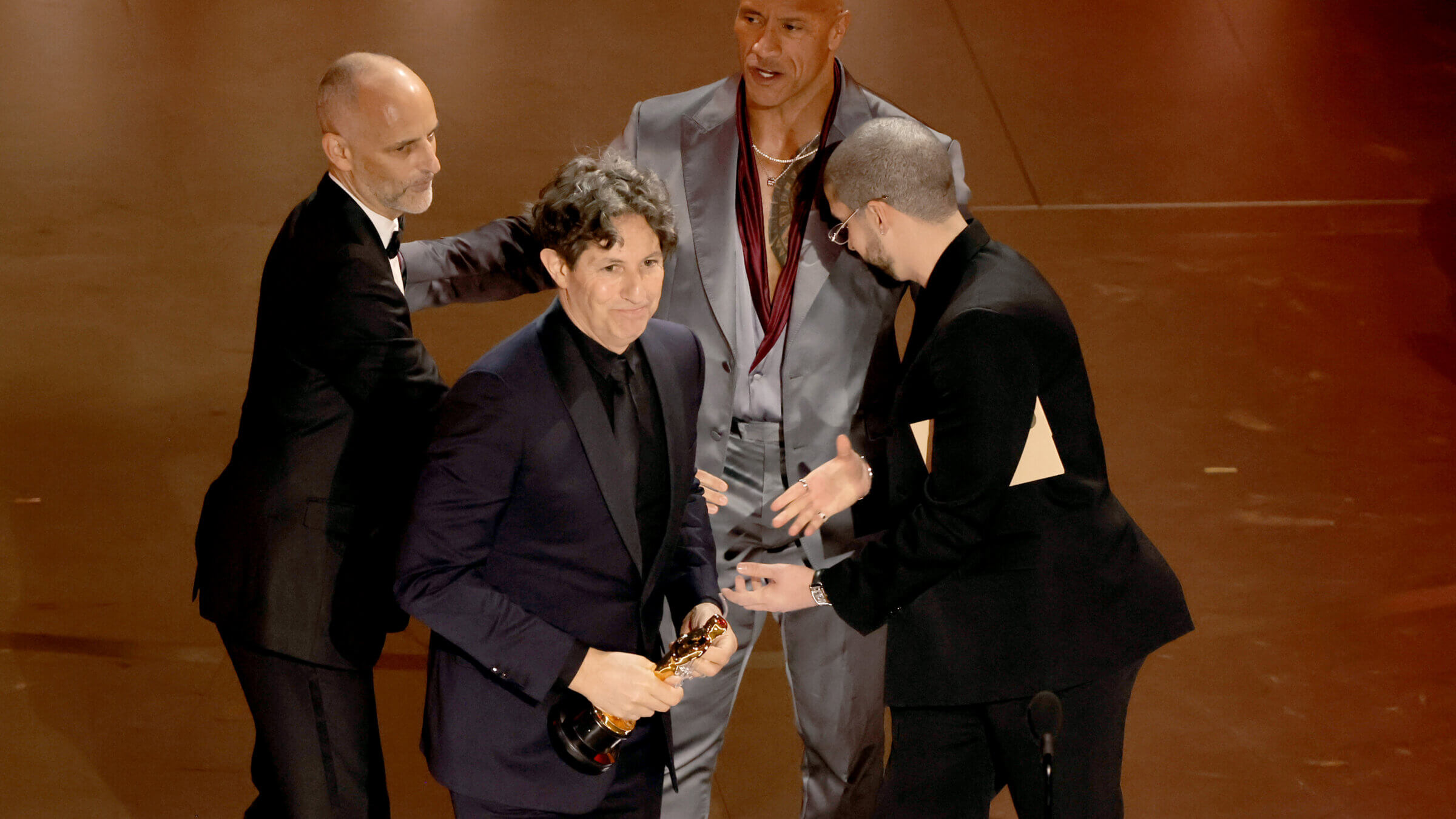No, Jonathan Glazer did not ‘refute his Jewishness’
The ‘Zone of Interest’ director’s words have been taken out of context

Jonathan Glazer, with producers Leonard Blavatnik and James Wilson, accepts the Oscar for Best International Film. Photo by Kevin Winter/Getty Images
It seems that even before he finished accepting his Oscar — or before any music played him off — critics slammed Zone of Interest director Jonathan Glazer for his speech Sunday night.
Abe Foxman, the former head of the Anti-Defamation League, posted to X (formerly Twitter) that while he was pleased that Glazer’s film won for best international film, “as a survivor of the Holocaust I am shocked that the director would slap the memory of over 1 million Jews who died because they were Jews by announcing he refutes his Jewishness.”
It was a case of selective hearing — and also an unwieldy sentence.
What Glazer, who didn’t quite deliver his speech with an orator’s bravura or impeccable diction, really said, reading off a paper, was that he and his fellow winners Leonard Blavatnik and James Wilson “stand here as men who refute their Jewishness and the Holocaust being hijacked by an occupation which has led to conflict for so many innocent people.”
(Representatives for Glazer and the film did not respond to a request for comment Monday morning.)
Jonathan Glazer’s acceptance speech for Best International Film for ‘THE ZONE OF INTEREST’ at the #Oscars pic.twitter.com/XNsMv0HDib
— Film Updates (@FilmUpdates) March 11, 2024
A clearer wording may have gone, “We refute the occupation’s hijacking of Jewishness and the Holocaust to justify a conflict that has caused pain for so many innocent people.” (This is pretty standard verbiage in pro-Palestinian and progressive Jewish circles.)
To hear that Glazer was refuting his Jewishness — and in the next breath the Holocaust — is absurd. He committed years of his life to making The Zone of Interest, an intricately filmed drama about the commandant of Auschwitz and his domestic banality of evil.
Foxman is right that it would indeed be shocking for a person who had made this film to use his time on the Oscar stage to “refute his Jewishness.” X’s community notes saw fit to set him straight, placing the full quote beneath Foxman’s post.
Foxman wasn’t alone in condemning Glazer’s speech, which went on to address the dehumanization in this latest war, “whether the victims of October the 7th in Israel or the ongoing attack on Gaza.”
John Podhoretz of Commentary posted something unprintable about where he thinks Jonathan Glazer should put his first Oscar. Michael Freund, a former adviser to Prime Minister Benjamin Netanyahu, posted to X that Glazer is “a self-hating Jew of the worst sort who exploits the Holocaust to attack Israel in public at the Oscars ceremony.”
In our inbox, Ari Ingel from the Creative Community for Peace issued a statement that read, “It’s disgusting to see that when the director of a Holocaust movie wins an award, he uses his platform to denounce his own Jewishness and co-opt the tragedy of the holocaust [sic] for his own political cause.”
In fact, Glazer was accusing Israel of co-opting the Holocaust and, again, he didn’t denounce anything but the occupation and the ongoing war’s well-documented suffering on both sides.
So what’s happening here? Did people only hear a fragment of Glazer’s speech, or did they preemptively choose not to like what he was saying because it was critical of Israel? Or, is the Holocaust taboo when it comes to the current war, even as many are keen to point out that Oct. 7 represented the greatest loss of Jewish life since the Holocaust?
(There’s another option, which is that critics may have read an unfortunately abridged quote that appeared in Variety that said Glazer “refuted his Jewishness” full stop.)
Certainly there is ample room to disagree with Glazer, but when no one engages in good faith with what he actually said, you aren’t disagreeing with him but with a straw man.
There is an irony to all this. Glazer, a veteran director of commercials, music videos and a handful of critically acclaimed films, is known for his precision. In his speech, being less than clear with his words left him open to being taken out of context or selectively quoted.
But then, Glazer wasn’t winning for speech and debate. He won for a film that asks difficult questions of its audience, daring them to interrogate their own biases and numbed responses to human tragedy.
The Zone of Interest — which also nabbed an award for sound design that meticulously recreates everything from gunshots to the rumble of Auschwitz’s industrial killing, all of it unheeded by the characters — is all about what we might choose to ignore for the sake of our own comfort.
Those misunderstanding what Glazer said — or willfully distorting it — are only proving his point.
A message from our Publisher & CEO Rachel Fishman Feddersen

I hope you appreciated this article. Before you go, I’d like to ask you to please support the Forward’s award-winning, nonprofit journalism so that we can be prepared for whatever news 2025 brings.
At a time when other newsrooms are closing or cutting back, the Forward has removed its paywall and invested additional resources to report on the ground from Israel and around the U.S. on the impact of the war, rising antisemitism and polarized discourse.
Readers like you make it all possible. Support our work by becoming a Forward Member and connect with our journalism and your community.
— Rachel Fishman Feddersen, Publisher and CEO





























